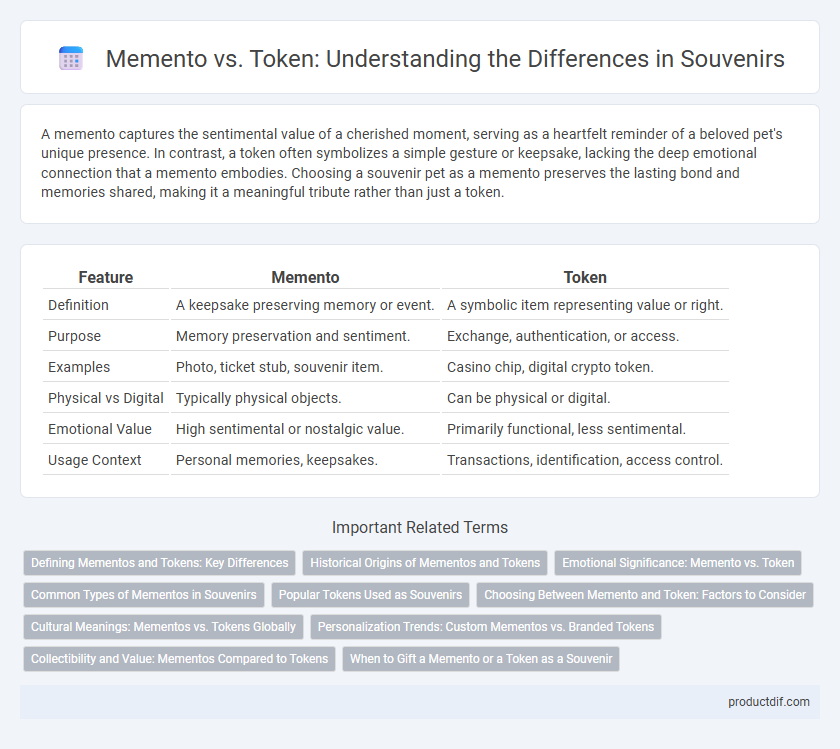A memento captures the sentimental value of a cherished moment, serving as a heartfelt reminder of a beloved pet's unique presence. In contrast, a token often symbolizes a simple gesture or keepsake, lacking the deep emotional connection that a memento embodies. Choosing a souvenir pet as a memento preserves the lasting bond and memories shared, making it a meaningful tribute rather than just a token.
Table of Comparison
| Feature | Memento | Token |
|---|---|---|
| Definition | A keepsake preserving memory or event. | A symbolic item representing value or right. |
| Purpose | Memory preservation and sentiment. | Exchange, authentication, or access. |
| Examples | Photo, ticket stub, souvenir item. | Casino chip, digital crypto token. |
| Physical vs Digital | Typically physical objects. | Can be physical or digital. |
| Emotional Value | High sentimental or nostalgic value. | Primarily functional, less sentimental. |
| Usage Context | Personal memories, keepsakes. | Transactions, identification, access control. |
Defining Mementos and Tokens: Key Differences
Mementos are physical keepsakes that capture a specific memory or moment, often carrying personal or emotional value such as photographs or handwritten notes. Tokens, on the other hand, serve as symbolic representations, frequently used to signify membership, achievement, or affiliation, like keychains or badges. The key difference lies in mementos emphasizing personal memory preservation, while tokens focus on symbolic meaning or recognition.
Historical Origins of Mementos and Tokens
Mementos and tokens both serve as tangible reminders, but their historical origins differ significantly. Mementos often stem from personal or cultural traditions where objects were kept to evoke memories or commemorate events, dating back to ancient civilizations that crafted keepsakes from materials like clay, bone, or wood. Tokens originated primarily as symbolic items used in trade, religious rituals, or social exchanges, with early examples including Roman tesserae and medieval trade tokens serving as proof of authenticity or value.
Emotional Significance: Memento vs. Token
A memento holds deep emotional significance as it directly connects to personal memories and experiences, often evoking powerful feelings tied to specific moments. Tokens, while meaningful, generally serve as symbolic representations of relationships or events without carrying the same personal narrative weight. The emotional impact of a memento is more profound due to its tangible association with cherished memories.
Common Types of Mementos in Souvenirs
Common types of mementos found in souvenirs include photographs, keychains, postcards, and magnets, each capturing memories from specific locations or events. These mementos provide tangible reminders of experiences, often personalized to reflect the cultural or historical significance of the place. Unlike tokens, which may hold symbolic value or serve as entry passes, mementos emphasize sentimental attachment and visual representation.
Popular Tokens Used as Souvenirs
Popular tokens used as souvenirs often include coins, keychains, and fridge magnets, each symbolizing a memorable experience or destination. Coins, especially those with unique designs or limited editions, serve as tangible reminders of specific places or events. Keychains and fridge magnets combine utility with sentimental value, making them favored mementos for travelers seeking to preserve their journey's significance.
Choosing Between Memento and Token: Factors to Consider
Choosing between memento and token as souvenirs depends on the emotional value and permanence desired. Mementos often carry sentimental significance and are physical reminders of specific memories, while tokens can symbolize experiences or relationships more abstractly. Consider the recipient's preferences, the occasion's nature, and the intended message when selecting the ideal keepsake to ensure meaningful preservation of moments.
Cultural Meanings: Mementos vs. Tokens Globally
Mementos carry deep personal and cultural significance, often representing cherished memories, historical moments, or spiritual beliefs unique to specific societies. Tokens, while sometimes sentimental, frequently serve as symbols of agreement, membership, or value exchange in diverse global cultures. Understanding these cultural distinctions enhances appreciation for how different communities preserve identity and relationships through tangible objects.
Personalization Trends: Custom Mementos vs. Branded Tokens
Custom mementos are gaining traction as personalized keepsakes, often incorporating names, dates, or meaningful symbols that resonate deeply with individuals. Branded tokens typically emphasize company logos and slogans, serving more as marketing tools than personal treasures. This shift highlights consumer preference for unique, emotionally significant souvenirs over generic, mass-produced items.
Collectibility and Value: Mementos Compared to Tokens
Mementos often hold personal or sentimental value, making them highly collectible for individuals seeking meaningful keepsakes that evoke memories. Tokens, typically mass-produced and standardized, possess more consistent market value but less emotional significance. Collectors prioritize mementos for their uniqueness and story, whereas tokens appeal due to rarity and monetary worth.
When to Gift a Memento or a Token as a Souvenir
Gift a memento as a souvenir to commemorate significant events or milestones, offering lasting emotional value through personalized or meaningful items. Tokens serve best as casual keepsakes or small gestures to acknowledge participation, friendship, or appreciation without the weight of deep sentiment. Choosing between a memento or token depends on the occasion's importance and the desired level of personal connection conveyed.
Memento vs Token Infographic

 productdif.com
productdif.com